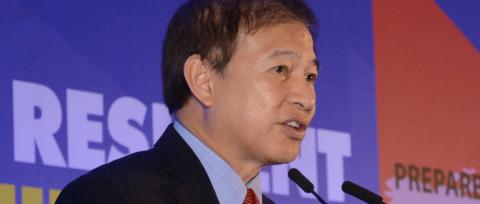
Rallying towards disaster preparedness, the Philippine Disaster Resilience Foundation (PDRF), in collaboration with the Carlos P. Romulo Foundation, the Zuellig Family Foundation, the Manila Observatory, and ARISE Philippines recently proposed an agreement with the government to create the National Disaster Resilience Council.
This provides a platform, which consists of a multi-stakeholder approach in building a disaster preparedness plan for a better Philippines. Moreover, this increases the country’s disaster resilience capacity in both the national and local government levels. Rooted in a collaborative partnership, the National Disaster Resilience Council also encourages the active participation of the private sector and the academe.
The building of the country’s National Disaster Resilience Council is one of the agenda during the recently held two-day multi-stakeholder forum aimed to sustain awareness on the urgency of building our country’s resilience both on the local and national scale. Its creation entails a stop gap in addressing the current state of the country’s disaster preparedness. This is in accordance to the Senate’s current plan of action in reviewing and consequently approving the existing law on disaster preparedness.
Serving as the third conference on disaster and climate resilience, the event was headed by Ambassador Roberto P. Romulo, who is the Chairman of the Carlos P. Romulo Foundation for Peace and Development as well as the Zuellig Family Foundation. Joining him as part of the organizing committee are PDRF Executive Director Marilou Erni; Zuellig Family Foundation President Ernesto Garilao; Dr. Eric Lacanlale, Former Director of Strategic Planning for the UN Industrial Development Organization in Vienna, Austria; and Antonia Yulo-Loyzaga, Chairperson of the Manila Observatory and International Advisory Board.
With more than 30 speakers representing foreign experts, senior government officials and representatives of the private sector, both corporate and NGOs, the conference seeks to identify the gaps in current disaster preparedness, prevention, response and recovery plans, both within the public and private sectors and between them. It also aims to advance action plans and recommendations for much needed legislative and policy reforms to support integrated, multi-stakeholder efforts. “All big change begins with a single idea. The two-day conference has been overflowing with great ideas and concepts, and this is where the real challenge begins – the leap towards creating an impactful and meaningful change,” said PDRF President Butch Meily, who delivered his closing remarks. “We can shape the future. We have the talent as well as partners coming from the government, private sector, the international agencies, and NGOs to make this country safer and more secure.”
The session topics included lessons learned from recent earthquake disasters and pathways to enhancing risk reduction measures. Topics also cover assessments of the resilience of our health, infrastructure and local government sectors as well as an overview of pre-disaster recovery planning, policy and practice. The current legislative agenda on both disaster risk reduction and resilience was examined along with proponents in Congress and the NDRRMC-OCD.
Joining Meily and Ambassador Romulo as keynote speakers, Department of National Defense Secretary Delfin Lorenzana, Former NDRRMC Executive Director and OCD Administrator Admiral Alexander Pama, DOST Undersecretary and PHILVOCS Director Dr. Renato Solidum, Jr., NDRRMC Executive Director Undersecretary Ricardo Jalad, Mayor Abigail Binay of Makati City, Albay Public Safety and Emergency Management Office Chief Cedric Daep, Pasig City DRRM Office Chief Ritchie Van Angeles, and Mayor Melchor Mergal of Salcedo municipality in Eastern Samar.
Speakers on the resilience of our critical infrastructure included Ed Chua of Shell; DPWH Undersecretary Cathy Cabral, president of the Philippine Institute of Civil Engineers and Undersecretary of DPWH; Bill Luz, PDRF; Engineer Erick Sison, president of the Association of Structural Engineers of the Philippines, and urban planners Dr. Arturo G. Corpuz, a board director of Ayala Land and Arch. Nathaniel von Einsiedel, an expert in disaster recovery and urban planning.
International guest speakers from Taiwan and Japan were also present in the two-day forum as they shared their own experiences on disaster preparedness from their home countries. These included Dr. Wei-Sen Li, who is the Secretary-General and Executive Director for the National Science and Technology Center for Disaster Reduction and APEC Emergency Preparedness Capacity Building Center, respectively; Dr. Satoru Nishikawa, Executive Director of Research for Japan Center for Area Development Research; and Shingo Kochi, Director for International Center for Environmental Management of Enclosed Coastal Seas. The final session encapsulated action plans and legislative proposals that emerged from all the sessions. Drawing on the presentations and discussions, proposed measures were drawn up with a view to strengthening the country’s disaster resilience. This includes action programs and protocols; legislative and regulatory changes; and a multi-stakeholder institutional framework to promote continuing cooperation, dialogue and information exchange among the key sectors of Philippine society.
The conference was part of the three-year program handled by the organizers to promote multi-sectoral dialogue and cooperation on building the country’s resilience to natural disasters and climate change in view of the country’s continuing high exposure and vulnerability to multiple natural hazards.

